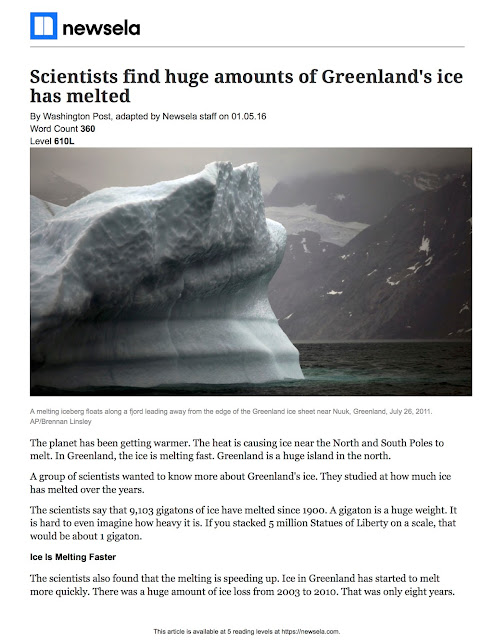Friday, March 6, 2020
Inquiry
Research
After picking an Arctic problem that appealed to them, each student then did some research on that problem. here are some of the articles that we read.
Ideation
After doing some research on their specific problem. Students did some ideation. Ideation is dreaming big ideas and inventions that solve problems. The students are encouraged to come up with all kinds of ideas, even wild ideas. Sometimes the wild ideas inspire the best idea. These are some of the ideas the students came up with to solve their Arctic problem.
Math
Subtraction
This week we continued to work on some subtraction mental math strategies and we started subtraction with stacking. I sent home a math practice booklet with subtraction questions for students to work on over the weekend. Next week we will started double-digit subtraction with regrouping.
Robotics
We also used the robots to do some more authentic coding. Students learned how to use If/Else statements to help their robot navigate the environment. As of now, most students are using variable, functions, and if statements to efficiently program their robot to solve math challenges. Below is some of our code.
Literacy
Arctic Story Writing
We started the actual writing process this week. We learned how to write beginnings and each student started writing their Arctic stories. As well we reviewed what makes a good sentence. We talked about proper capitalization and punctuation, using descriptive language, and expressing a complete idea. Below is the beginning of our class idea we wrote together.
Word Work
In Mr. Sandberg's Word Work group, students practiced editing, identifying, using "ow" words. We noticed the two difference sounds that "ow" can make and that "ow" usually falls at the end of a core word, here's some of the words we brainstormed.
Health
 Our class has had several friendship and inclusion issues this week and so for Health, we read the book, "Making Friends Is an Art!" by Julia Cook. Afterwards we talked about what it means to be a good friends and brainstormed ways to make friends.
Our class has had several friendship and inclusion issues this week and so for Health, we read the book, "Making Friends Is an Art!" by Julia Cook. Afterwards we talked about what it means to be a good friends and brainstormed ways to make friends.
Making Friends Is An Art! Video
Research
After picking an Arctic problem that appealed to them, each student then did some research on that problem. here are some of the articles that we read.
Melting Glaciers, Icebergs, Sea Ice
The Permafrost is Melting!
Animals Losing Their Arctic Habitat
Ideation
After doing some research on their specific problem. Students did some ideation. Ideation is dreaming big ideas and inventions that solve problems. The students are encouraged to come up with all kinds of ideas, even wild ideas. Sometimes the wild ideas inspire the best idea. These are some of the ideas the students came up with to solve their Arctic problem.
Math
Subtraction
This week we continued to work on some subtraction mental math strategies and we started subtraction with stacking. I sent home a math practice booklet with subtraction questions for students to work on over the weekend. Next week we will started double-digit subtraction with regrouping.
Robotics
We also used the robots to do some more authentic coding. Students learned how to use If/Else statements to help their robot navigate the environment. As of now, most students are using variable, functions, and if statements to efficiently program their robot to solve math challenges. Below is some of our code.
Literacy
Arctic Story Writing
We started the actual writing process this week. We learned how to write beginnings and each student started writing their Arctic stories. As well we reviewed what makes a good sentence. We talked about proper capitalization and punctuation, using descriptive language, and expressing a complete idea. Below is the beginning of our class idea we wrote together.
Word Work
In Mr. Sandberg's Word Work group, students practiced editing, identifying, using "ow" words. We noticed the two difference sounds that "ow" can make and that "ow" usually falls at the end of a core word, here's some of the words we brainstormed.
Art
We sketched and painted some Arctic animals check them out.
Health
 Our class has had several friendship and inclusion issues this week and so for Health, we read the book, "Making Friends Is an Art!" by Julia Cook. Afterwards we talked about what it means to be a good friends and brainstormed ways to make friends.
Our class has had several friendship and inclusion issues this week and so for Health, we read the book, "Making Friends Is an Art!" by Julia Cook. Afterwards we talked about what it means to be a good friends and brainstormed ways to make friends.Making Friends Is An Art! Video
Celebration
Thanks for coming to our celebration of learning. I hope you enjoyed seeing the learning that we do.
Below are two links to the specific robotics activities from our Grade 2 Celebration of Learning. Enjoy!
Phys Ed.
ROS Students are currently participating in a ‘Circus’ unit in PE class. We are learning a variety of new tricks using various equipment such as juggling sticks, scarves, hula hoops, spinning plates, diablos, tossing rings and juggling clubs. Students are encouraged to check out the Youtube channel, the National Circus Project. Below is a list of videos that students can watch to inspire them to try new tricks while in the gym. We are very excited about this unit! Thanks for your support!
|
For over 25 years the National Circus Project has been a leader as one of largest not-for-profit circus arts-in-education organizations. Here's a look at one of our shows in New York!
www.youtube.com
|
***Beginner videos are a great starting point***
Devil Sticks (juggling sticks)
Scarf Juggling
Hoops
Plates
Diablo


























Comments
Post a Comment